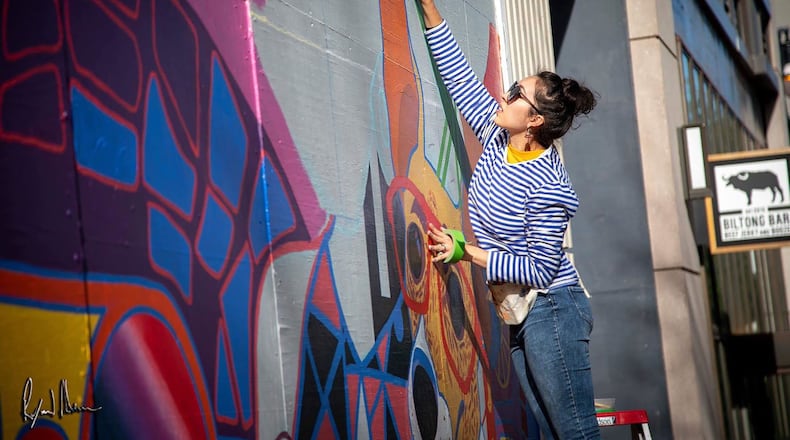Artist Carla Contreras, 29, grew up in the capital city of Ecuador, Quito, in the Andean foothills, the child of two architect parents.
“I feel a lot of nostalgia about those times,” Contreras says of her happy childhood spent hiking with her family, gardening and viewing the mountains of Cotopaxi, Antisana, and Cayambe from her home. “A life without internet and social media was also much more gratifying and meaningful.”
“I feel so lucky and blessed to have been born in such a biologically and culturally diverse place,” she says of her native Ecuador.
Currently an MFA candidate at the Savannah College of Art and Design in Atlanta, Contreras is one of 220 artists whose color-saturated commentaries on the fracas of city life will be featured in the annual SCAD Open Studio online event June 26-28. This year the event will be virtual, and allow buyers to purchase works by current SCAD students, alumni and faculty online.
Both of Contreras’ parents encouraged her interest in art, she says. She was especially drawn to the art supplies her father, a frustrated artist, kept meticulously arranged in his studio. “I would always sneak in his studio to grab some of his precious watercolors, perfectly organized markers, and vast collection of paper. He would teach me how to properly use all these materials, however, I have always been more experimental, intuitive and expressive. My mother saw that early interest in the visual and plastic arts in me, and always encouraged me to become an artist.”
Contreras initially came to America for a study abroad program at Pennsylvania’s Elizabethtown College in 2012. “I love that in the U.S things ‘get done’ and things happen,” Contreras says of a country that has embraced her artistic ambitions. Since arriving at SCAD in 2016 she has exhibited at Mint Gallery and MOCA GA. This spring she completed a mural at the Shops Buckhead Atlanta, a vibrant, kinetic, typically colorful ode to “diversity and transculturalism” she says featuring representations of herself, her Brazilian-American husband, Abraham Dos Santos, and their Jack Russell terrier, Zatara (Spanish for “raft”).
Living in Atlanta for three years without a car has deeply imprinted the conceptual thrust of Contreras’ work. “Using public transportation and walking in the city was crucial to the birth and development of my ideas,” she says. “This determined the whole direction of my intentions and voice as an international artist living and producing here.” That way of traveling through Atlanta gave Contreras a sense of the city’s rhythms, of development and gentrification but also the human element — often lost, or rendered invisible — by all that growth.
Homelessness and mental illness on the city streets were inescapable issues. She was especially moved by the plight of a homeless woman who lived on a bench at a MARTA bus stop near the High Museum. She would pass the woman on her way to SCAD, until one day the woman was gone. The city had removed the bench where she lived. Contreras documented her feelings about homelessness, privilege, mental health and human fragility in a work done in her usual media of acrylic and latex paint, oil pastels, paint pen and graphite “Ikea Bags,” in acidic shades of orange, green, mauve and blue. The painting shows the painful disconnect between the world of domestic plenitude symbolized by those Ikea bags and the reality of loss and poverty for that homeless woman. Contreras saw how the homeless were almost invisible in the cityscape. She depicts the woman as a shrouded, faceless figure, her head downturned, surrounded by the bright blue bags that contain all of her worldly possessions.
For Contreras, that woman exemplified so much of what she had observed of American life and inspired her desire to create socially engaged art like the artists Olafur Eliasson and Alfredo Jaar whose work she admires.
“It is about the importance of cultivating empathy towards realities that may seem distant, but that in reality could happen to anyone, to a friend, to a family member, or even to ourselves. Empathy is essential to evolve and thrive as a community.”
SCAD Open Studio (a portion of the proceeds benefit the SCAD Student Relief Fund), June 26-28, openstudio.scadartsales.com
About the Author
Keep Reading
The Latest
Featured






